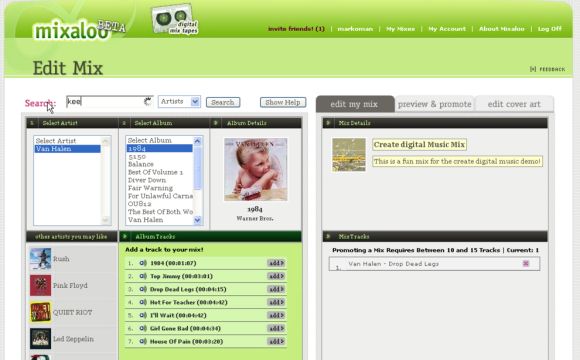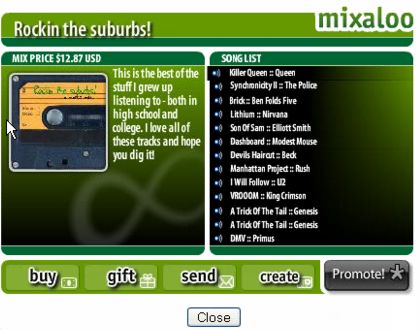
The Web holds huge potential for music sharing and music discovery, but figuring out how to make that potential work — and how to navigate copyright and licensing laws in the process – has been a major challenge. This week, the creators of the website Mixaloo promised to “bring mix tapes into the digital age.” Whether you buy into that concept or not, or their particular implementation, the site does demonstrate both some of the opportunities and legal hurdles in Web sharing. They also inherit the closed model supported by labels (no full streams, previews only, DRM), but already that’s changing (MP3, and the promise, hopefully, of full-length tracks soon). It’s like a microcosm of the whole business at the moment.
I spoke to the founders shortly before launch, and they described how their approach differs from the online radio model, which is constrained in part by the law:
There’s the streaming radio camp … you have a minimum of forty tracks, you can’t have the same artist twice in a row, and then you get into the whole mess of royalties. Then there’s the way we’re going — user-generated albums. And we like that because it’s personalized.”
The basic model:
- 10 or more tracks on the “mix tape”
- Mix your album from 3.5 million + tracks.
- Majors and indie music — the founders say they have “deals with all the major labels” but also “a ton of independent aggregators like CD Baby, The Orchard, and Iota
- Embed players and market mixes on Blogger, MySpace, Facebook, Friendster, etc.
- Sell tracks via any of your players and earn a 50% commission
- For now, 30-second previews — but hopefully that will change? (more in a moment)

To make it easier to compile mixes, the tool incorporates a recommendation engine, so when you select a track, Mixaloo guesses other likely artists and tracks. You can also add custom feedback to the engine if you disagree, which is a badly-needed outlet missing from a lot of online music sites. When you’re ready to purchase tracks, the major option now is Windows Media files with PlaysForSure DRM — but that’s changing. 600,000 tracks are already on DRM-free MP3, that number is growing, and the service gives preference to MP3 over WMA. (The big picture: I think DRM might remain for subscription tracks or rental, but purchases will likely all be DRM-free in the near future via any outlet that wants to stay in business.)
So that’s the good news — now the deal-killer. For now, Mixaloo supports only 30-second previews, which to me pretty much defeats the purpose. (Mixaloo says that “the feedback we’ve gotten across the board has been positive” after several thousand users on the beta, but I think the service will fail to catch on until they can get full-length streams.) They do say full-length tracks are something they’re talking to the labels about, without making any specific promises.
That said, as we discussed in regards to Pandora, there is a potential for artists to make these tools work for them. Using playlists of artists you like, artists who influenced you, artists like you (artists who are copying you?) could be a great promotional tool. Why wait for iTunes to call and make you a celebrity playlist author when you can dub yourself a celebrity? (Seriously.)
The trick with all of this is not necessarily to sign with a major label, but simply to get hooked up with the right online distribution outlets. Once you do that, you can connected with any number of online music outlets. There’s no saying whether Mixaloo will or won’t take off, but you’ve got plenty of other online tools to try. The Mixaloo team advises that “for an independent artist, the path of least resistance would be to register with a CD Baby for digital distribution,” while indie labels (of which we have a few reading this site) might work through Iota Music Publishers or The Orchard. And this approach also works for sites like Pandora; see our interview there for thoughts about how people might use these various tools, and how musicians could benefit from them.
Previously:
Pandora’s Founder on Decoding Taste and Promoting Indie Music